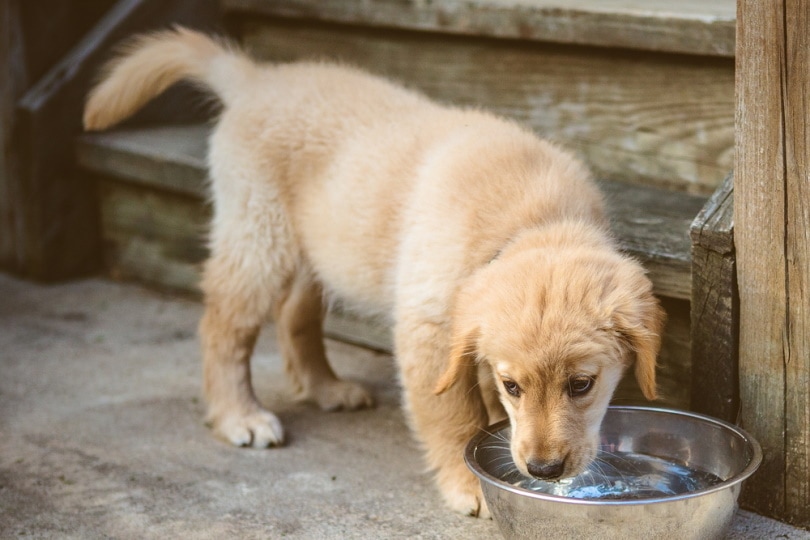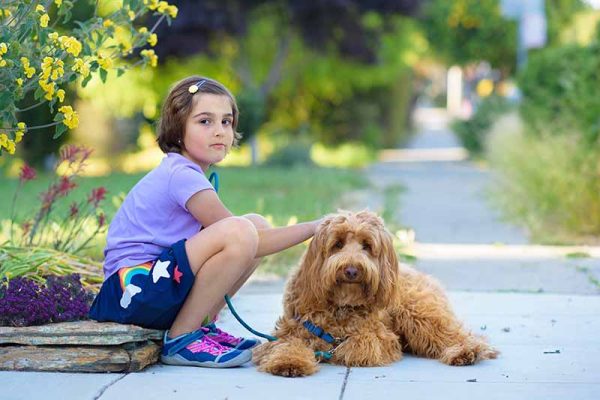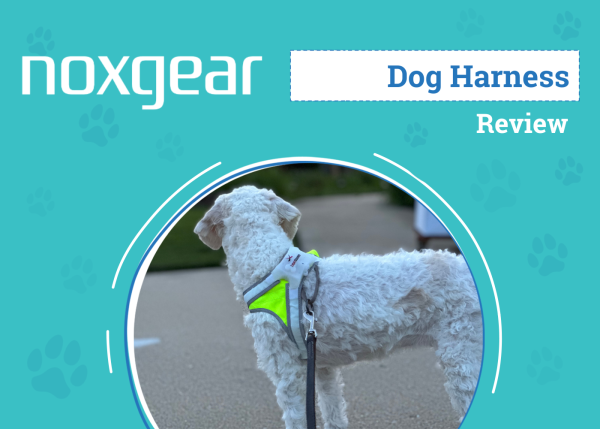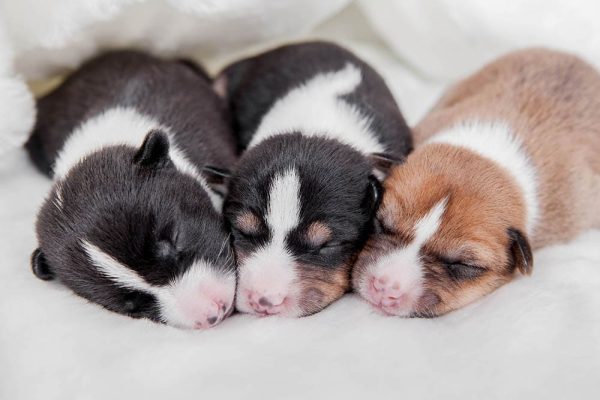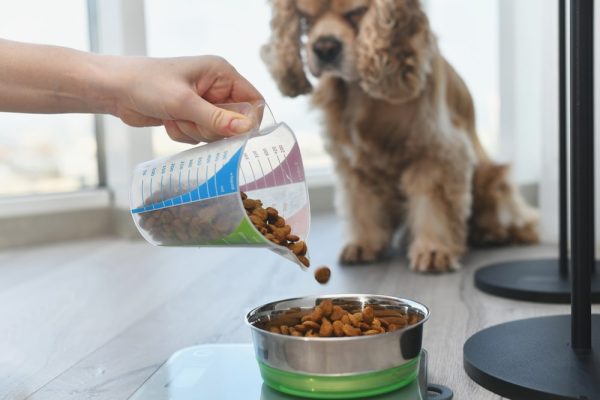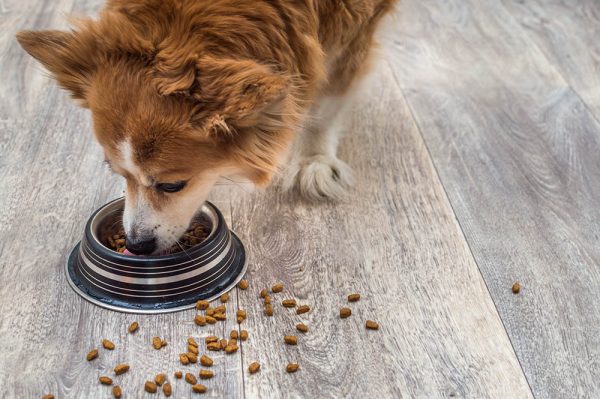In this article
Puppies need water to stay alive. While they may not drink a lot at once, they do need continuous access to water for small sips. Puppies are smaller, after all, so they don’t require huge amounts of water, but the exact amount will depend on their age, size, activity level, the moisture content of their food, and other factors. Healthy dogs may consume between 50 to 70 milliliters of water per kilo body weight on a daily basis.1 Puppies’ smaller size means that they do need to drink every few hours, though.
Without water, a puppy will die of dehydration within 72 hours. They will get very sick with signs of dehydration within 24 hours. In very wet areas, puppies may need less water. In extreme environments, dogs need more water. During the summer, puppies require more water to regulate their temperature and keep themselves well hydrated. While dogs don’t sweat, they’ll lose water through panting, urinating, and defecating.
For this reason, you should always leave water out for your puppy. In cold weather, be sure that the water isn’t frozen. Your puppy should be inside, anyway. However, if your puppy does venture outside, provide water and check for any freezing regularly.
If your puppy is crate trained, make sure they have water in a secure bowl in their crate so that it can’t be spilled. Dogs should have water available at all times at home, outside, and during walks or travel.

What Happens When a Puppy Gets Dehydrated?
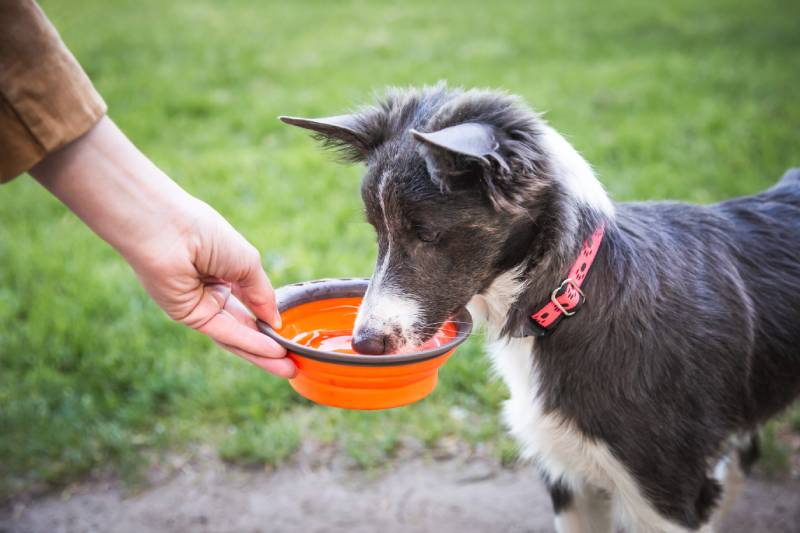
If you don’t provide your puppy with enough water, they may become dehydrated. Practically everything a dog does requires water. Your puppy’s organs are constantly using liquid to function. Even on a mild day, your dog needs water, so it must be continually replaced. Panting on hot days makes it easier for puppies to get dehydrated with the risk of heatstroke if they do not have adequate shelter and shade.
When your puppy isn’t drinking enough water to replace the water that has been used through normal bodily functions, they will become dehydrated. How long this takes depends on the climate, their activity level, and if any water is available at all. A reduction in body fluid will compromise organ function and make your puppy sick.
Without water, the dog will eventually die. However, other complications can occur beforehand, including kidney damage that can be irreversible if not treated urgently.
Because puppies are younger with a lower body weight and more fragile than adults, they are at higher risk of dehydration, particularly if they are not eating or drinking as well or if they have gastrointestinal fluid loss through vomiting and diarrhea. Dehydration is an emergency, and only your vet can assess the severity of this condition.
As tempting as it can be to try and treat minor dehydration at home by providing small amounts of water, this will not work, especially if your puppy is not feeling well and is refusing food and water. You should call your vet, though, as puppies are prone to serious complications when dehydrated.
Contact your vet immediately if your dog displays any signs of illness (which can then lead to dehydration) or actual signs that point to dehydration, such as lethargy, weakness, poor appetite, refusing water, vomiting, diarrhea, dry gums, reduced skin tenting (when the skin is lifted at the back of the neck and does not go down instantly), sunken eyes, loss of coordination, etc.
While it may be logical to give your puppy lots of water when they’re dehydrated, this isn’t going to deal with the cause of the issue and may not be sufficient enough to replace the fluid loss. If your dog is given too much water at once and they are suffering from a stomach upset, they may drink too fast and vomit, thus worsening the dehydration. Giving small amounts of water or ice chips helps your dog keep the water down so that their body can absorb it until you can get them to the vet, who can administer intravenous fluids in order to correct the dehydration.
If you need to speak with a vet but can't get to one, head over to PangoVet. It's our online service where you can talk to a vet online and get the advice you need for your pet — all at an affordable price!
How to Prevent Dehydration in Puppies
If your puppy is healthy and has access to water at all times, then they should drink enough to maintain their fluid balance. You should let your puppy drink as little or as much as they want. Dogs do get thirsty when their bodily fluids are low, prompting them to drink.
Providing your puppy with clean water is the best way to prevent dehydration. You should be extra certain that the water is clean and available if your puppy is outside or in a crate. Check the water bowl often.
Puppies are prone to dehydration due to diarrhea and vomiting, though. Because they’re so small, they can lose water faster during an illness. If your pet has vomiting or diarrhea, you should contact your vet right away. Even if the underlying illness is benign, dehydration can occur and cause serious complications. Your vet may recommend hospitalization and using an IV to give the dog continuous fluids, as well as medication to prevent further fluid loss.
How to Tell if a Puppy Needs Water
If your puppy doesn’t have water, you should provide it. A puppy cannot drink too much, so there is no reason to withhold water from your canine.
You can check for dehydration in a number of ways. First, you can check the elasticity of their skin, which lessens when the dog is dehydrated. To test this, gently pull on the dog’s skin at the back of the neck and wait for it to return to its original position. If it doesn’t do so quickly, your puppy may be dehydrated. Individual skin elasticity and extra wrinkles can also impact this test, so speak to a vet if you are worried about your puppy.
Furthermore, your dog’s gums will lose lubrication when your puppy is dehydrated. You can run a finger along your dog’s gum to check whether it’s moist. If it is dry and sticky, your puppy may be dehydrated. Use the opportunity to also check the color of your puppy’s gums, which should be pink at all times. Anything else, such as pale gums, warrants a quick trip to the vet.
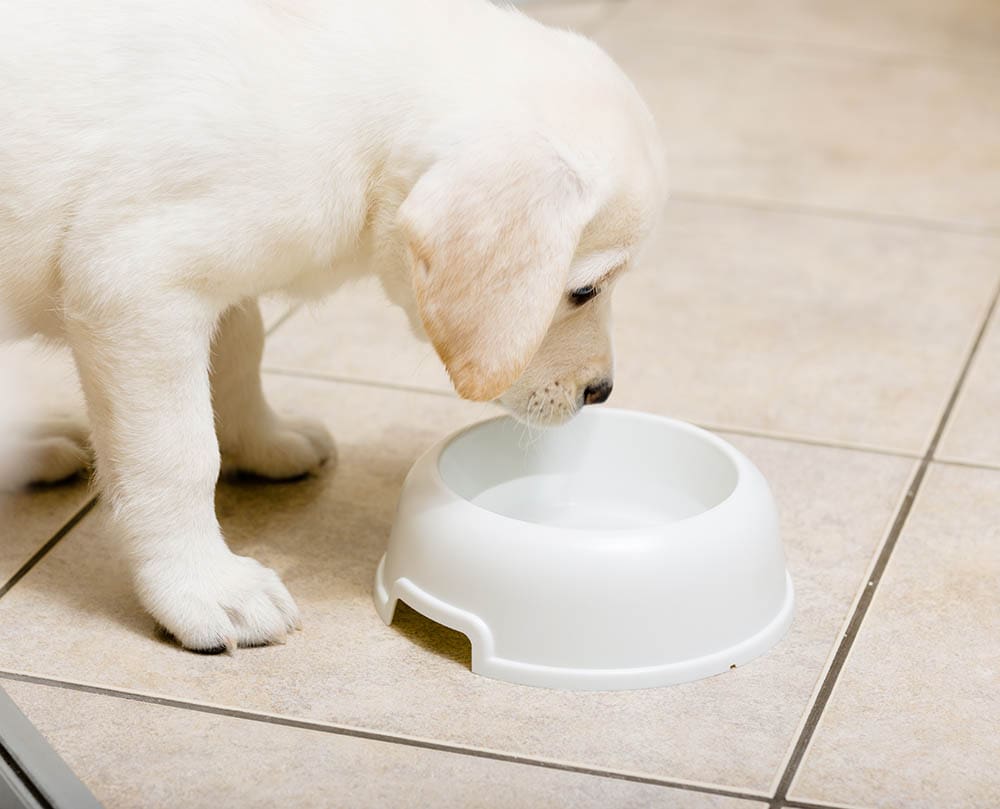
Can Puppies Go Through the Night Without Water?
This depends on their age and size, as well as their drinking habits. It would be best to make sure your puppy has access to fresh water at all times. They should also be taken to the toilet just before bedtime and first thing in the morning, as they won’t be able to hold it as long as adult dogs.
Although some puppies may be fine overnight without having a drink, this is not in their best interest. Some dogs drink more than others, and this depends on many factors. Their water bowl should be secured so it can’t overturn and spill.

Summary
Puppies require regular drinks just like adult dogs and humans. Because they’re smaller, they require smaller amounts of water more frequently. You should provide your puppy with water constantly—even overnight, and especially during walks and travel. Dehydration can cause serious health complications and is generally caused by many illnesses.
Most of the time, puppies develop dehydration due to vomiting and diarrhea or not eating. Both of these issues lead to fluid loss. When abundant or ongoing, the fluid loss can quickly lead to dehydration. Veterinary care is always necessary and recommended to prevent further complications.
Featured Image Credit to: kathleen collins, Shutterstock
